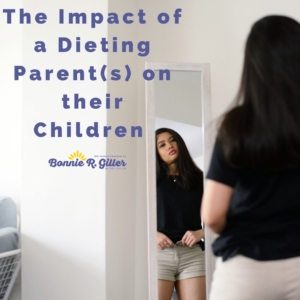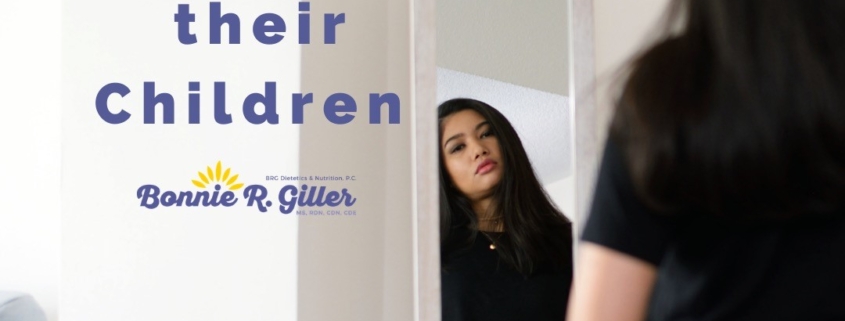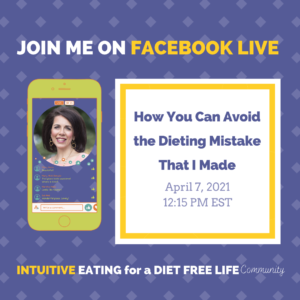The Impact of a Dieting Parent(s) on their Children
 It’s not unusual to have at least one parent in the home dieting at any given time. And often, both parents are on the diet bandwagon, sometimes following the same diet, and sometimes vastly different diets.
It’s not unusual to have at least one parent in the home dieting at any given time. And often, both parents are on the diet bandwagon, sometimes following the same diet, and sometimes vastly different diets.
What message do you think this sends to your children?
Mom and/or dad are eating differently, and they are trying to change their bodies which sends the message that there are good foods and bad foods, and that there must be something wrong with their body if they are trying so hard to change it.
Research shows that children of parents who speak about weight are more likely to have negative feelings about their own bodies and experiment with unhealthy behaviors such as not eating enough, using laxatives, detoxes, cleanses and diet pills.
In one study published in the Journal of American Medical Association Pediatrics, adolescents where more likely to control their weight in unhealthy ways and binge eat if their parents spoke about weight loss in their presence. This was seen in both sons and daughters. However, when parents engaged in conversations that were focused only on healthful eating behaviors, these kids were less likely to diet and use unhealthy weight-control behaviors.
In a second study published in Body Image, parents who spoke about controlling their weight were more likely to raise high schoolers who were dissatisfied with their bodies.
Parental Diet Talk
A parent’s “diet talk” and modeling of unhealthy “dieting” behaviors sets the scene for their children to develop a poor relationship with food and their body.
Children are like sponges, they soak up everything they hear and see parents do. You may not think they are noticing what you are doing or saying, but they are. Kids notice everything!
When you look in the mirror and mutter under your breath how your tush looks so big, your child hears this and interprets it as “my tush is big, there must be something wrong with it.”
We, as parents must be VERY careful not to discuss weight, dieting, and labeling of foods around our children.
The messages surrounding dieting, weight loss, body image, and food will stay with children FOREVER and impact them for the rest of their life.
6 Side Effects of Parental Dieting on Children
1. Develop Disordered Eating and Eating Disorders
If you diet in front of your children, they are more likely to restrict their own intake, binge eat, and engage in emotional eating because they saw mom or dad engaging in these behaviors (children are modeling what they see).
One client shared with me that she learned to binge and purge from her dad (and he didn’t even know it). She witnessed him binge eat after dinner most nights of the week, then go into the bathroom and purge. Years later, she is trying to recover from her own eating disorder.
2. Develop a Dieters Mindset
Children will pick up on messages, phrases or actions they see within the home. If you are displaying “dieting” behaviors, like tracking food, negatively discussing certain foods/food groups, weighing/measuring your foods, and speaking poorly about your body, this will be internalized by the child and kickstart their own “dieters mindset”, or “dieting habits”.
Here’s a common scenario:
Mom/Dad: “I can’t eat that, it has so many carbs! I’ll gain 20 lbs. by the morning!
Child: Hears this statement and immediately decides not to eat any carbs because it is now associated with ‘instant weight gain’.
3. Fall into the Toxic Trap of Diet Culture
If children have been surrounded by dieting messages from their parents, they are more likely to fall into the negative, toxic trap that is known as diet culture.
Diet culture is all around us—in advertisements, social media, in the workplace/school, and so much more!
Diet culture conditions use to believe that our self-worth is tied to weight, body size, what we eat, and what we look like.
With strong dieting messages in the home PLUS a world saturated with diet culture, the child will inevitably have a poor relationship with food and a negative body image.
Don’t set your child up for a life of food struggles and body hatred. Embody the habits you desire for your children!
4. Negatively Impact Child’s Weight, Growth and Health
Due to extreme restriction, bingeing, or a combination of the two, children can become significantly under- or over- weight. This can lead to health issues down the line (i.e., nutrition deficiencies, missed milestones, weakened immune system, disease etc.)
5. Create Body Image Issues
Because the child has been hearing mom or dad speak negatively about their body, the child will internalize these messages and in turn also never feel satisfied with their bodies.
Here’s a common scenario:
Mom/Dad: “Ugh, I’m so fat! These jeans don’t fit me like they used to.”
Child: Hears this statement and associates weight gain with feelings of sadness, shame, negativity; also demonizes the idea of a larger body. These thoughts about body image can transcend into adulthood.
6. Cause Mental Health Issues
Dieting is harmful on a physical level and a mental health level. Dieting causes one to feel like a failure, have low self-esteem, depression, and low self-worth. This trickles down into all aspects of life and relationships.
If your children are grown, married, and have children of their own, consider how your dieting habits are impacting your grandchildren when they come to visit.
Make a conscious decision to be more aware of your actions at home and help change the trajectory of your children’s (and grandchildren’s) future relationship with food and their bodies.
If you’d like support, just reach out to me and schedule a complementary call at http://TalkWithBonnie.com
And join me later today to hear about the dieting mistake that I made and it’s impact on my daughters (and how you can avoid making this same mistake). It’s all happening in my private Facebook Group HERE.
(If you are reading this after April 7, 2021, the replay of today’s live training is in the Facebook Group for you to watch at any time. Click here to join our group.)













Leave a Reply
Want to join the discussion?Feel free to contribute!